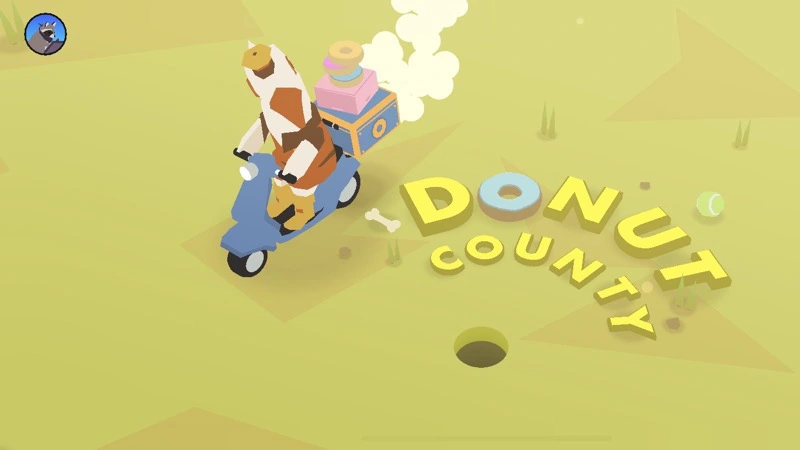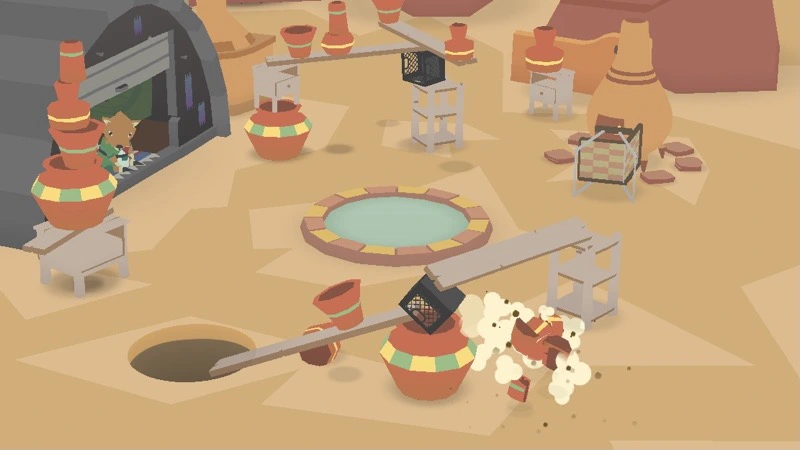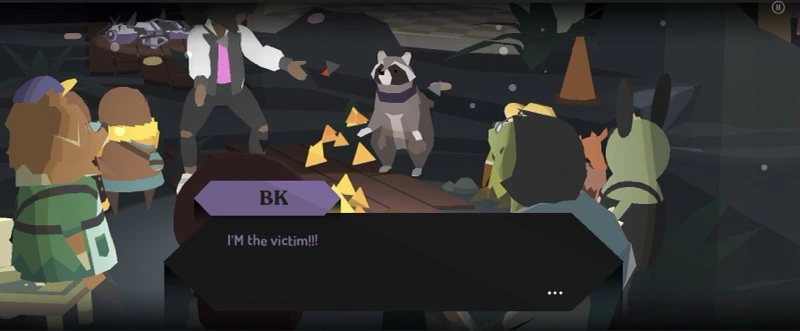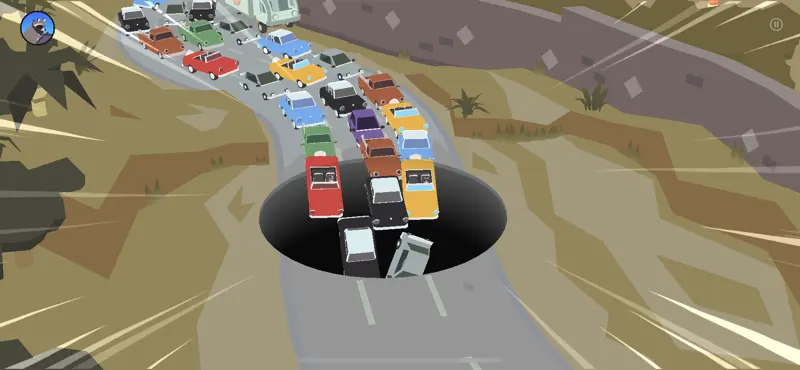by Dan McAlister

Score: 3/5
Available: iOS, Mac App Store, Steam, PlayStation 4, Switch, Xbox One
Donut County is a game about rummaging through other people’s junk, so it’s fitting that its main character, BK, is a raccoon. He works for a donut shop, a shop that does delivery. But BK isn’t sending out crullers. Instead, he uses a tablet app to open a small hole on the customer’s property. Then he ransacks the place.
As the player, you control these seemingly bottomless holes through BK’s tablet. When you first “deliver” a hole to an unsuspecting customer, it’s minuscule and inoffensive. You direct it across the ground, sweeping it underneath bookshelves and chicken coops, but it’s too small to be disruptive; at most you might jostle a chair leg or spook a pet dog, but the scene will remain largely undisturbed.
Then you find a tennis ball, or a wad of paper, or a small plant. Skip the large stuff, and you’ll find smaller detritus that drops away into the dark below. And each time you do, the hole pops open a little wider.
Moving on, you’ll find that your “donut” can accommodate increasingly large objects. Books, tires, birdcages. That stool looks like it can fit, even with the person sitting on top. You’ll eventually swallow up boulders, trees, pottery studios and homes, as small scale rummaging turns into total property obliteration.

Believe it or not, BK’s “work” is not universally appreciated, and the job of explaining that to him falls on his friend Mira. Mira shares a lot of similarities with BK: they both work at the same donut shop, neither shows much enthusiasm for the job, and they’re both quick to laugh, at least over text. But Mira is not a raccoon, nor are the dozen or so townspeople who begin the game in a dark pit “nine hundred ninety-nine feet” below town. Now, how do you think they get there?
In dialogue that plays out in this abyss, we see Mira and the townspeople confront BK over his actions. But BK always deflects: that wasn’t me, I was just doing my job, maybe we’re all better off in a dark pit (I’m writing this in 2020, so that last one is pretty understandable). And each conversation is followed by a flashback, a playable level of what happened, of how exactly BK destroyed that person’s life.

But for all the conflict and objections raised in the dialogue scenes, there’s no real tension to the gameplay sections of stealing people’s stuff. The rummaging of Donut County is enjoyable; I had fun sifting through belongings, popping up refuse, knocking over benches stacked with clay pots and watching them smack the ground and shatter. But there’s also little to stop you, or push back against you. Mira wants BK to recognize how much he’s hurt others, but the main gameplay scenes don’t reflect this viewpoint. The characters rarely signal annoyance, despair, or much of anything as their belongings are seized and destroyed. They’ll stare blankly as a growing, ominous pit swallows up their car and sofa, and only express mild surprise as they themselves topple into the unknown.
These scenes of rummaging feel grounded in BK’s perspective that he’s doing nothing wrong, so it makes sense that he believes in his innocence. Meanwhile, Mira’s forceful pushback represents the game’s story at its best; she’s upset with him not because he’s terrible (he’s pretty terrible, though), but because they’re friends, and she wants him to be better. At the very least, she wants him to understand and acknowledge the harm he’s inflicted on everyone else. These scenes are written with a kind of furious, exasperated compassion. We see Mira lash out, wanting to hurt BK in the same way he’s hurt others, but it’s couched in a concealed sadness. Why is this so hard for BK to understand?
I’ll remember their dynamic more than I’ll remember the property destruction, because the scenes of rummaging and stealing mostly lack the tension that makes BK and Mira’s relationship so interesting. Like I said, the knocking things over, breaking things, stealing things, that’s all fun! But without a counterbalancing force, or a citizenry that push back on what you’re doing, the gameplay is more of an amusing procedure than the chaotic mischief I had expected.
Donut County shifts toward the end of the game, introducing an antagonism in its gameplay through characters that do mind you stealing their things, and they act accordingly. The final levels show what the game could have been, and it’s much better for it. But for most of the game’s brief runtime (just over 2 hours), Donut County is an undemanding and enjoyable hangout. I had fun, but I also wish the game took more after Mira than BK.

Pilediver is a review series where I play through the many, many games in my backlog. Thank you for reading.
The opinions in this post are expressly the views of the author and do not reflect the views of their employer(s) or any entities that they might otherwise be affiliated.